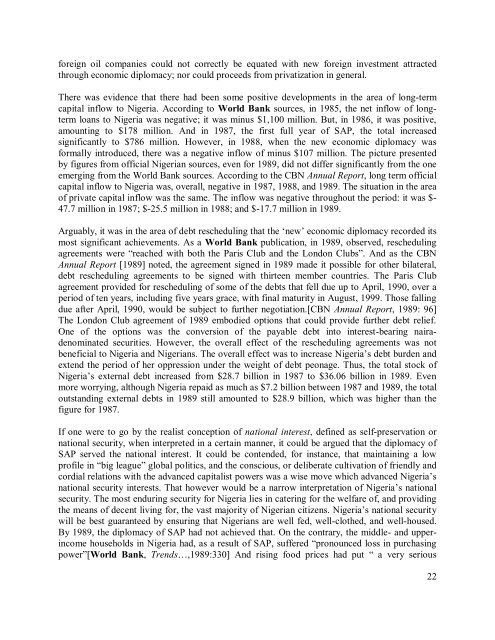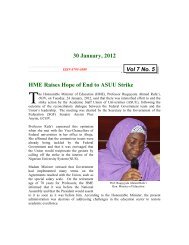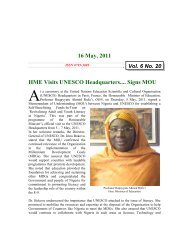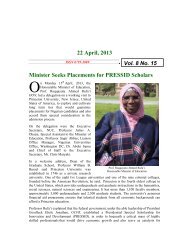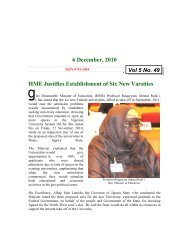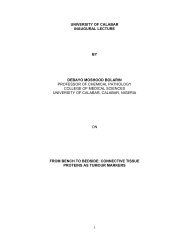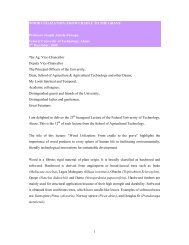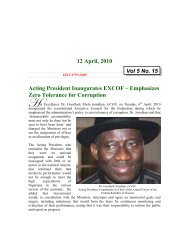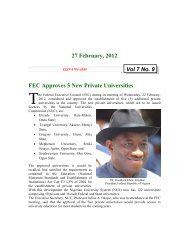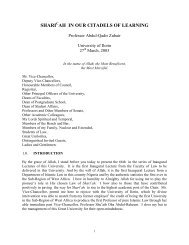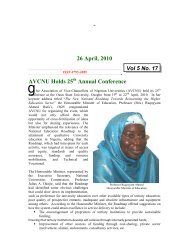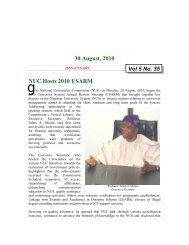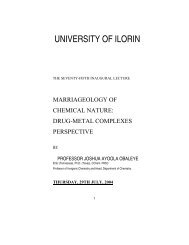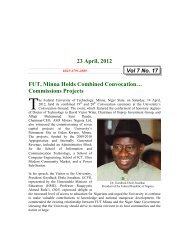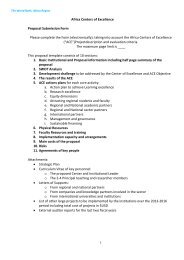From State And State Power To Man And Social - National ...
From State And State Power To Man And Social - National ...
From State And State Power To Man And Social - National ...
You also want an ePaper? Increase the reach of your titles
YUMPU automatically turns print PDFs into web optimized ePapers that Google loves.
foreign oil companies could not correctly be equated with new foreign investment attractedthrough economic diplomacy; nor could proceeds from privatization in general.There was evidence that there had been some positive developments in the area of long-termcapital inflow to Nigeria. According to World Bank sources, in 1985, the net inflow of longtermloans to Nigeria was negative; it was minus $1,100 million. But, in 1986, it was positive,amounting to $178 million. <strong>And</strong> in 1987, the first full year of SAP, the total increasedsignificantly to $786 million. However, in 1988, when the new economic diplomacy wasformally introduced, there was a negative inflow of minus $107 million. The picture presentedby figures from official Nigerian sources, even for 1989, did not differ significantly from the oneemerging from the World Bank sources. According to the CBN Annual Report, long term officialcapital inflow to Nigeria was, overall, negative in 1987, 1988, and 1989. The situation in the areaof private capital inflow was the same. The inflow was negative throughout the period: it was $-47.7 million in 1987; $-25.5 million in 1988; and $-17.7 million in 1989.Arguably, it was in the area of debt rescheduling that the ‘new’ economic diplomacy recorded itsmost significant achievements. As a World Bank publication, in 1989, observed, reschedulingagreements were “reached with both the Paris Club and the London Clubs”. <strong>And</strong> as the CBNAnnual Report [1989] noted, the agreement signed in 1989 made it possible for other bilateral,debt rescheduling agreements to be signed with thirteen member countries. The Paris Clubagreement provided for rescheduling of some of the debts that fell due up to April, 1990, over aperiod of ten years, including five years grace, with final maturity in August, 1999. Those fallingdue after April, 1990, would be subject to further negotiation.[CBN Annual Report, 1989: 96]The London Club agreement of 1989 embodied options that could provide further debt relief.One of the options was the conversion of the payable debt into interest-bearing nairadenominatedsecurities. However, the overall effect of the rescheduling agreements was notbeneficial to Nigeria and Nigerians. The overall effect was to increase Nigeria’s debt burden andextend the period of her oppression under the weight of debt peonage. Thus, the total stock ofNigeria’s external debt increased from $28.7 billion in 1987 to $36.06 billion in 1989. Evenmore worrying, although Nigeria repaid as much as $7.2 billion between 1987 and 1989, the totaloutstanding external debts in 1989 still amounted to $28.9 billion, which was higher than thefigure for 1987.If one were to go by the realist conception of national interest, defined as self-preservation ornational security, when interpreted in a certain manner, it could be argued that the diplomacy ofSAP served the national interest. It could be contended, for instance, that maintaining a lowprofile in “big league” global politics, and the conscious, or deliberate cultivation of friendly andcordial relations with the advanced capitalist powers was a wise move which advanced Nigeria’snational security interests. That however would be a narrow interpretation of Nigeria’s nationalsecurity. The most enduring security for Nigeria lies in catering for the welfare of, and providingthe means of decent living for, the vast majority of Nigerian citizens. Nigeria’s national securitywill be best guaranteed by ensuring that Nigerians are well fed, well-clothed, and well-housed.By 1989, the diplomacy of SAP had not achieved that. On the contrary, the middle- and upperincomehouseholds in Nigeria had, as a result of SAP, suffered “pronounced loss in purchasingpower”[World Bank, Trends…,1989:330] <strong>And</strong> rising food prices had put “ a very serious22


